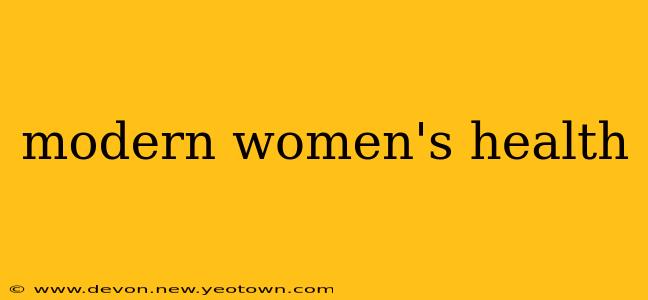The landscape of women's health has undergone a dramatic transformation in recent decades. No longer are we confined to the limited understanding of the past. Modern women are empowered with knowledge, technology, and a proactive approach to their well-being, leading to a more nuanced and comprehensive understanding of their bodies and their health journeys. This isn't just about managing symptoms; it's about embracing holistic wellness and preventative care. Let's delve into the key aspects shaping modern women's health.
What are the biggest challenges facing women's health today?
This is a question with many facets. One of the most significant challenges is the sheer complexity of modern life. Stress levels are high, work-life balance is often precarious, and societal expectations can be overwhelming. This contributes to a rise in mental health issues, such as anxiety and depression, alongside physical manifestations like chronic fatigue and digestive problems. Furthermore, access to quality healthcare remains a significant barrier for many women, particularly those from marginalized communities or with limited financial resources. Lack of insurance, geographical limitations, and systemic biases all play a role. Finally, the sheer volume of conflicting information available online can be daunting, making it difficult to discern reliable sources from misleading ones.
What are some common health concerns for women in their 30s?
The 30s often mark a significant transition period for women. Many are juggling careers, families, and personal responsibilities, putting immense pressure on their physical and mental well-being. Common concerns include managing stress effectively, addressing potential fertility issues if planning a family, navigating hormonal changes, and paying close attention to preventative screenings like mammograms and pap smears. The early detection of potential problems becomes increasingly crucial during this decade. Moreover, lifestyle choices made in their 30s significantly impact their long-term health.
What are some common health concerns for women in their 40s?
As women enter their 40s, hormonal shifts associated with perimenopause and menopause come into play. These changes can bring about a wide range of symptoms, including hot flashes, night sweats, sleep disturbances, mood swings, and vaginal dryness. Beyond hormonal fluctuations, women in their 40s should also be vigilant about heart health, bone density, and maintaining a healthy weight. Regular exercise and a balanced diet become increasingly important for mitigating age-related changes and preventing chronic diseases. This is also a time when mental health support becomes even more critical as women navigate the complexities of mid-life.
How can women improve their overall health and well-being?
This isn't a one-size-fits-all answer, but rather a journey of self-discovery and proactive engagement. Prioritizing regular exercise, maintaining a balanced and nutritious diet, and ensuring adequate sleep are fundamental pillars of good health. Stress management techniques, such as meditation, yoga, or spending time in nature, are equally crucial for mental and emotional well-being. Regular visits to a healthcare provider for check-ups and screenings are essential for early detection and prevention. Building a strong support network of friends, family, or a therapist can provide invaluable emotional support and guidance. Finally, prioritizing self-care activities—even small acts of kindness towards oneself—can make a significant difference in overall well-being.
What role does mental health play in women's overall health?
Mental health is intrinsically linked to physical health. Neglecting mental well-being can have detrimental effects on the body, impacting everything from sleep patterns and immune function to cardiovascular health and chronic pain. Stress, anxiety, and depression can exacerbate existing health conditions and contribute to the development of new ones. Therefore, addressing mental health concerns proactively is as crucial as tending to physical health needs. Seeking professional help when necessary, practicing self-compassion, and building resilience are essential aspects of maintaining holistic well-being. Modern women are increasingly recognizing this crucial connection and prioritizing mental health as a fundamental aspect of their overall wellness.
What are some resources available to women for improving their health?
Many resources are available, catering to diverse needs and preferences. These include online platforms providing information and support communities, mobile health apps tracking fitness and health data, telehealth services offering virtual consultations, and various support groups connecting women with shared experiences. Local community centers and hospitals often host wellness programs and workshops. Governmental and non-profit organizations offer valuable resources, ranging from educational materials to financial assistance for healthcare services. Ultimately, it's crucial to actively seek out resources that resonate with individual needs and preferences.
The journey to optimal health for modern women is a continuous process of self-discovery, empowerment, and proactive engagement. By addressing the challenges, embracing advancements, and prioritizing holistic well-being, women can navigate the complexities of the 21st century with strength, resilience, and a vibrant sense of self.

